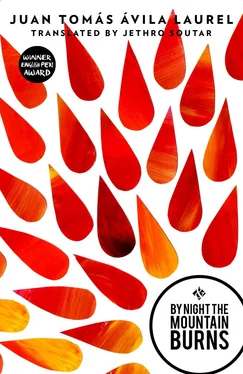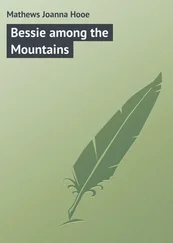Juan Ávila Laurel - By Night the Mountain Burns
Здесь есть возможность читать онлайн «Juan Ávila Laurel - By Night the Mountain Burns» весь текст электронной книги совершенно бесплатно (целиком полную версию без сокращений). В некоторых случаях можно слушать аудио, скачать через торрент в формате fb2 и присутствует краткое содержание. Год выпуска: 2014, Издательство: And Other Stories Publishing, Жанр: Современная проза, на английском языке. Описание произведения, (предисловие) а так же отзывы посетителей доступны на портале библиотеки ЛибКат.
- Название:By Night the Mountain Burns
- Автор:
- Издательство:And Other Stories Publishing
- Жанр:
- Год:2014
- ISBN:нет данных
- Рейтинг книги:5 / 5. Голосов: 1
-
Избранное:Добавить в избранное
- Отзывы:
-
Ваша оценка:
- 100
- 1
- 2
- 3
- 4
- 5
By Night the Mountain Burns: краткое содержание, описание и аннотация
Предлагаем к чтению аннотацию, описание, краткое содержание или предисловие (зависит от того, что написал сам автор книги «By Night the Mountain Burns»). Если вы не нашли необходимую информацию о книге — напишите в комментариях, мы постараемся отыскать её.
By Night the Mountain Burns — читать онлайн бесплатно полную книгу (весь текст) целиком
Ниже представлен текст книги, разбитый по страницам. Система сохранения места последней прочитанной страницы, позволяет с удобством читать онлайн бесплатно книгу «By Night the Mountain Burns», без необходимости каждый раз заново искать на чём Вы остановились. Поставьте закладку, и сможете в любой момент перейти на страницу, на которой закончили чтение.
Интервал:
Закладка:
Night advanced, the fire went on advancing and grandfather remained where he was, standing up, perhaps cursing his lack of paddling expertise, and we noticed that he was crying, and, what’s more, we noticed that the chair he usually sat on, which was empty right then, had a round hole in the seat, where the middle part of his backside would go. But it wasn’t a hole made by accident: it was a special chair with a hole that had been put there deliberately. This discovery, big though it was, couldn’t distract us from our fear, a fear grandfather made worse with his crying. We were crying too and so his tears added to our tears, although only one or two of us actually saw the tears on his cheeks. As night was well advanced and the whole thing was shaping up to be very distressing, grandmother sent us to bed. It was impossible to tell what she thought about the whole situation, but she thought it was time we went to bed, even though she must have known we wouldn’t be able to sleep with a fire breathing down our necks, with our lives hanging by a thread that might be singed at any moment. We could tell she was afraid, but she hid her emotions from us and so we didn’t know whether she thought the same way we did about grandfather’s attitude, the feelings he’d openly shown, or whether she felt the same way he did. We knew she was afraid but it was impossible to gauge how afraid she was. Nevertheless, when she sent us to bed we obeyed, and we did so because we needed someone to give us an order, as an indication of the gravity of the situation if nothing else. An order from an adult, a person we loved and trusted, and who we knew loved us. If she’d told us to go down to the beach and paddle aimlessly out into the deep blue sea, we’d have obeyed, understanding that it was our only hope given the grave danger we faced. But she told us to go to bed, so we went to bed, a bed we typically woke up in several times during the night because it was sopping wet. And do you know why it was sopping wet? Yes, you know. Oh, the stink of stale urine! Anyway, there we were, lying in bed, while outside, up on the Pico, a fire burned that threatened to raze the big village to the ground. We’d left grandfather up on his feet, rather than sitting in his chair, a chair that had a hole in the middle of the seat, a hole he usually hid by covering it with a cloth, or a rag, or some kind of fabric at any rate, that he draped over his knees and tucked his hands beneath. We left him there unable to hold back the tears, even if they were only two little trickles that ran down his face. The way we saw it, those tears were revealing, because he was an adult. If an adult was crying, it was because the situation was a lost cause. Why did the man cry? Did the fire remind him of something that had happened to him before he knew us? What did it remind him of? Or maybe he cried because he wasn’t an adult but a child? That could have been it, that would have explained a lot, because on our island the only people who didn’t fish or paddle canoes and who cried about things they didn’t understand were children. Nor could children enter the vidjil to talk to the adults there. Didn’t I begin by saying I never knew whether my grandfather was mad? Didn’t I say I never quite knew what he was? Well, we discovered part of what he was that day, on the balcony, and when we went into his room. Which I’ll tell you about later.
That night was one of the most restless nights of our young lives and we woke up in a soaking wet bed, the unstoppable river having flowed with such vigour it might have been used to put the fire out. The mattress was sodden, from head to toe, sodden with something that seemed to gush out of you the moment you were about to wake. Those morning pees were the worst, the ones that happened when the adults had already left the house. They were the worst because they made you think that if you’d only woken up a minute earlier, you’d have done so with a full bladder and been able to open the front door and aim your stream in the sand. You wouldn’t bother writing your name or drawing a house or anything so early in the morning, you’d stretch and yawn as you peed, eyes half-closed. Peeing outside was the best; we always peed outside, even though we had a bathroom in the house. So when you woke to find the bed freshly wet with the spray of your own pee, you were angry with yourself because you’d been so near to waking up a hero, returning triumphant from war. I say war, but whatever really, anything you can return from triumphant. Or undefeated, at least. Not having been struck down by stones, witchcraft or evil.
We got out of the wet bed and went to look at the mountain that had put the fear of death in us the previous night. Everything was bare and black. Bare because all the vegetation on the mountain had burned, leaving only the rock itself, the immense rock that was the mountain. And black because it was all scorched, that greedy fire having raged through everything in its path: bushes, shrubs, lizards, centipedes, snakes, the nests of hens that ran wild on the island and laid their eggs up there. All the rats had died, rats that were the scourge of the plantations. But the worst of the inventory was the total destruction of the plantations. We didn’t see the damage for ourselves, for we didn’t go up there, but from the house we saw women come back from the plantations in tears. The look of despondency on their faces told of what they had seen. Mango trees, that belonged to nobody and everybody, their leaves and fruit burned along with their seeds, the seeds which were the fruits of the future. Cassava plants with stems and leaves burned, though the cassavas themselves had been saved, protected as they were underground. Banana and plantain trees with everything burned, and only those yet to bear fruit would ever grow back. Yam plants with the overground parts burned, the leaves and stalks that tangle up with neighbouring trees as they climb, though the yams, like the cassavas, had survived, meaning the owner of the plantation would have to have a very good memory to remember where she’d planted everything. Malanga plants weren’t so affected because they didn’t really grow on the Pico; they needed the moister ground of the southern plantations. All the snakes, crabs, lizards and lizards’ eggs burned. And I mustn’t forget the rats, all of them destroyed by the fire, all those rats and mice that were such a scourge of the women’s plantations. Maybe I already mentioned the rats, but it’s worth mentioning them again, because of the terrible damage they used to cause. The eggs of all the snakes also burned. Can you imagine the job the women now faced to resurrect their farms, to revive them from the state I’ve just described? They cried over the catastrophe that had befallen them. They’d already cried the night before, when the fire was raging, but out of fear that the flames would devour us. Now they cried for their wasted labour. They left the yams as they were, for the overground parts would sprout again with the first rains. They recovered what plantains and bananas they could, those that had reached a certain ripeness and hadn’t been totally scorched. As for the cassava, the cornerstone of our island diet, they pulled them from the ground and rescued what they could. The cassava plant can’t survive the death of its stalk, and the stalks had surrendered their sap to the all-consuming fire. It was such a terrible pity, but, more than a pity, it meant a lot of hard work, hard work wasted and hard work to come, to make use of so many cassavas, large and small, cassavas that should have remained underground and sustained the family for several years. Of course the women put them to good use, making breads and flour, but the plots were left moribund, as if they’d never been planted in, so the women would have to start again from scratch at the beginning of the rainy season, plant everything all over again and then wait almost a year before gathering the first fruits. It was such a pity to have lost so many years of effort, and all because of a fire whose cause still nobody knew. Given what I know now, and all that happened afterwards, I can say with some conviction that it was for the best that nobody ever knew exactly how the fire started. For I know now that all people are not treated equally when it comes to apportioning blame for bad things that happen in communities. I know that, in this world of ours, how facts are judged depends on who’s doing the judging. I learned all this later, after seeing what happened on our Atlantic Ocean island.
Читать дальшеИнтервал:
Закладка:
Похожие книги на «By Night the Mountain Burns»
Представляем Вашему вниманию похожие книги на «By Night the Mountain Burns» списком для выбора. Мы отобрали схожую по названию и смыслу литературу в надежде предоставить читателям больше вариантов отыскать новые, интересные, ещё непрочитанные произведения.
Обсуждение, отзывы о книге «By Night the Mountain Burns» и просто собственные мнения читателей. Оставьте ваши комментарии, напишите, что Вы думаете о произведении, его смысле или главных героях. Укажите что конкретно понравилось, а что нет, и почему Вы так считаете.












